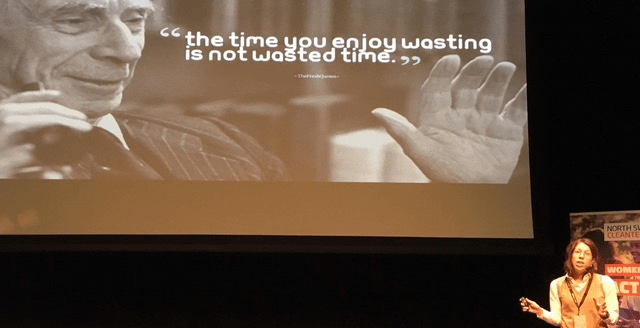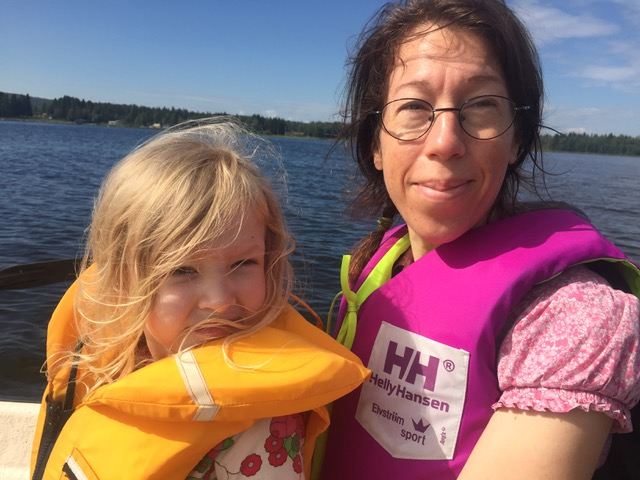Johanna is Co-founder and CTO of Codemill AB, which provides products and services for the media supply chain, she is a computer scientist, with a special interest in theoretical computer science, multimodal data analysis, and machine learning, she is a winner of many awards, including EY Swedish Entrepreneur Of The Year, this leader was also on the list of Sweden's ten most innovative entrepreneurs, a list compiled by the ÅForsk Foundation and the SISP, Swedish Incubators & Science Park.
Who is Johanna Björklund? define yourself
I'm a 41 year old woman from Umeå, a small town in northern Sweden. I am a computer scientist who develops algorithms for media analysis, which involves "a lot of maths". I am also an entrepreneur, but more in the sense of a gardener than a poker player. I am the mother of a brilliant little girl and the wife of a kind and intelligent man. Politically, I identify as liberal left-wing atheist feminist vegan-ish. I love long-distance running, drawing, playing the piano, and I'm more often listening to an audio book than not. I go to bed early, bringing my crossword puzzle; I rise early, and watch the birds flock at the bird feeder while the kettle boils. I never back down from an argument.
How were you as a kid?
As a kid, I was insanely fond of animals of all kinds - living and dead. I would scream “horse!” at the top of my lungs every time we drove by one. I once found a run-over adder and put it in the cooler to show my cousin who would visit us the next day, but my mother made me throw it away. I put it on an ant hill to give the ants a meal. They were delighted.
My parents tell me that as a very young child, I was outgoing and assertive, but that my personality changed when we moved to another part of town around that I was 8, and that I became more shy and quiet. All the time, I loved reading and maths. My parents encouraged me to do sports, and did not impose ideas of what hobbies girls ought to have, so my childhood was filled with dolls and guinea-pigs, but also with badminton, telescopes and air guns.
"It is difficult to create luck, but you can create an opportunity by being visible, networking, and keeping your eyes open. It is also helpful to bridge different spheres, as in my case, the academy and the industry, because it allows you to create value simply by transferring ideas"
Your background is in computer science, with a special interest in theoretical computer science, multimodal data analysis, and machine learning. And you hold a Ph.D. at Umea University, why did you choose those courses of study?
The way I was brought up, it was never an option not to go to university. I wanted to study math, but I also wanted a good job and I knew I liked programming, so I decided to major in computer science. In parallel to my studies, I started to work part-time as a computer consultant and eventually this grew to a full-time, with me managing the course work on the side.
However, around the time I had my degree, the IT-bubble burst and the company that I was working for was shut down. I had long been thinking about doing a PhD, so I asked around at the Computer Science department and someone suggested that I'd speak to the new professor from Germany. His field was theoretical computer science, which is essentially mathematics, and he had funding for a PhD student. I was incredibly lucky to get that position, but it took many years before I realized it.
The research we did was on tree automata, a formalism for representing, among other things the syntactic structure of language. Over time, our interest turned towards graph automata, which can also capture semantic, i.e., deeper and more abstract aspects. Finally, we started to look not only at the language, but also at the media that it is embedded in, and that led me to my current field of study, which is a semantic analysis of multimodal data. Machine learning is one of the tools we use to learn computational models from data, but we often have to modify the learning algorithms to work in our setting.
You are the CTO of tech firms in the TV and film technology space, Codemill and Accurate Video, tell us more about your companies, what they are about and what makes them unique?
Codemill provides products and services for the media supply chain. Our main product range is called Accurate Video and designed for global publishers and broadcasters. What makes Accurate Video unique is not that it is cloud-based, even if that is a relatively new standard in broadcast and entertainment. It is the fact that it breaks down into individual apps by function (say for editing, or quality control.) Those modular programs are both uniquely user friendly, as well as friendly to any other app or setup - meaning they slot easily into and enhance other software which companies are already using.
At Codemill as a whole, we emphasize collaboration and self-improvement, and this has allowed us to attract talented and friendly developers.
Another sister business, Adlede is a media intelligence company that offers contextual targeting for advertising campaigns. This means that we use what is popularly called Al to place advertisements alongside relevant articles, video or other content. For instance, it could be that the topic of the advertisement fits this context, or that the two are simply addressing the same audience. Contextual advertising essentially benefits everyone involved: publishers receive higher bids for their ad space, advertisers have greater control where their messaging appears in the online media landscape, and readers get relevant offers without the use of cookies or any other type of behavioral tracking. Some of our early customers were Swedish IKEA and Tullverket, and we are now setting up shop in London.
"To get women interested in STEM, we need to separate what is core to STEM, from what attributes are linked to the field by common association. Recognizing the diversity of people and careers in STEM benefits everyone, men and women alike"
You are the winner of several awards, including EY Swedish Entrepreneur Of The Year, region north, as well as earlier in the same year being lauded as one of the top serial entrepreneurs under 40, a list compiled by Di Digital, you were also on the list of Sweden's ten most innovative entrepreneurs, a list compiled by the ÅForsk Foundation and the SISP, Swedish Incubators & Science Park, you are researcher and professor at UMEA University in Sweden. What´s the recipe for your success?
The outward success represented by awards is a combination of hard work and luck, and the latter is probably more important. It is difficult to create luck, but you can create an opportunity by being visible, networking, and keeping your eyes open. It is also helpful to bridge different spheres, as in my case, the academy and the industry, because it allows you to create value simply by transferring ideas.
An important thing to know about this type of success is that it acts as a heavy turning wheel. It is hard to get it in motion, but once it is, it feels like it turns off its own accord. Another thing is that, at least for me, success can be almost as stressful as a failure. When things don't go my way, I can usually shrug it off pretty easily, but when something really good happens, I get all teary-eyed and want to hide under the table.
In your opinion, what are the reasons girls don't want to study careers in STEM? What we should do as a society to change that fact?
My impression is that women as a rule think that these topics are not for them. And in some ways, I am guilty of this myself. I am of course more than comfortable with math´s and computers - even seeing them as if they were created for my personal enjoyment. On the other hand, I am still amazed at people who can install solar panels or fix a leaking toilet without professional help. For me, these seem like complex and dangerous undertakings, far outside my comfort zone.
Still, I try to catch myself thinking this and at least add a question mark after the thought. I do not believe that these ideas have anything to do with female nature, they're just a product of our society's stereotypical ideas about men and women.
To get women interested in STEM, we need to separate what is core to STEM, from what attributes are linked to the field by common association. For example, liking math's doesn't mean that you have to be an introvert; doing a degree in computer science doesn't mean that you cannot also be outdoorsy. Recognizing the diversity of people and careers in STEM benefits everyone, men and women alike.
"If you never encounter adversity, then you will never know what you are made of, and surely everyone is curious about that"
Everybody has had dark moments in their lives, what have you done to get out of that phase?
Perspective is important. In comparison to what other people have lived through, my personal disasters pale. Even if you become terminally ill in Sweden, you know that you will receive good palliative care, and that the family you leave behind you will be safe and cared for.
Gratefulness is also a big one. I have already lived a longer and fuller life than the average person, so even if it was to end today, I would not feel cheated. Another helpful thought is that if you never encounter adversity, then you will never know what you are made of, and surely everyone is curious about that.
Also, your biography would be boring. Finally, I try never to think about problems when I’m tired, ill, and it's dark outside. I leave them for morning-me to solve, and she’s good at that.
What is the reality of your day-to-day?
The overall structure is probably similar to most working parents. It is a strange mix of challenging professional tasks and trying to explain to your kid why walking backwards to the car is not “hurrying up”.
I like the “getting things done” methodology, and try to accept that there will always be more tasks on my table than I can manage, but at least I get to choose which things will actually be done.
To manage stress, I try to get at close to eight hours of sleep per night (with varying success), and go for a run in the forest five times a week.
Do you have any particular philosophy that guides your career decisions?
Yes, unfortunately. I am a lot like a bulldog, once I start a project, I have difficulties letting go, so I tend to just add projects and roles to my already long list. Aside from “it’s never too late to give up”, my favorite quote is Bertrand Russell’s “Love is wise, hatred is foolish”, which applies to every possible situation.
"If I could have everything, then I would have everything, but I can’t, and I’m happy with that. Again, it’s a matter of prioritizing"
What do you love most about your job? & what is the most difficult part?
What I love most about my job is also the most difficult part: that it is so varied and challenging.
On the research side, we wrestle with a mathematical proof of the properties of different algorithms. At the company level, it is more about strategic business development and forming functional technical partnerships. It makes my brain do summersaults.
What’s the biggest lesson you’ve learned over the years?
There is a right amount of failure, and that is not zero. I keep a list of attempts, e.g., articles submitted for publication or patent applications, and mark them up as successful or failed as the answers come in.
My belief is that if I succeed in everything, then I have set the bar too low. Then again, too many failures are demoralizing and mean that a lot of time has been lost that would have been better invested elsewhere. Right now, my hypothesis is that around 80% success is optimal, according to some imaginary scale of measuring success.
As an entrepreneur, what is the one thing you do over and over and recommend everyone else does?
Prioritize. The opportunities are endless, but time and energy are not.
What is one strategy that has helped you grow your business?
I am part of a team of extremely talented co-founders and managers, so I cannot claim credit for these strategies, but at Codemill / Accurate Video, what we are doing is to reinvent the media supply chain as a cloud service, so that it scales well and supports distributed teams.
In combination with this, we use AI technology to automate what used to be manual production steps. At Adlede, we bring a new type of media intelligence to the existing advertising ecosystem, which means that we have very little competition from existing players.
What situation marked your life in a way that prompted you to be who you are today
Being the daughter of loving and encouraging parents who did their best to protect me from harmful gender roles.
"Men are hired for potential, whereas women are hired for skill. I can’t count how many times I have heard that a man has been recruited to a position because of his ambition and ability to grow, but I have actually never heard this about a woman"
What do you like to do in your spare time?
Spending time with my daughter, although it can be quite stressful, especially when she wants to climb things. Aside from that, running in the forest (we have many lovely trails where I live), practicing the piano, listening to audio books (most recently, David Mitchell’s Thinking About It Only Makes it Worse), drawing, and like most people I know, having the occasional TV series binge (most recently, the South Korean historical zombie drama Kingdom).
Many authors say women can and must strive to have everything – a shining career, blossoming family life and a perfectly balanced lifestyle all at once, others point out that– then women are placing unrealistic expectations on themselves if they believe they can have it all, you have kids I don´t know if you have a husband, so according to your experience, what do you think about these statements?
I really don’t know about the statistics, but if I were to speculate, I would say that we feel under pressure to show that we can have successful careers without at the same time neglecting more traditional female duties, like home, children, relationships and physical appearance. I am sure that the media doesn’t help because it gives such a select view into the lives of our peers.
If I could have everything, then I would have everything, but I can’t, and I’m happy with that. Again, it’s a matter of prioritizing.
What tips, can you give to young girls who want to become an entrepreneur like you?
Being an entrepreneur is like being a mom, you can prepare to some degree, but you really have to live it to learn it.
Even if you yourself like planning and keeping things organized, the world around us is strange and unpredictable, so it is wise to develop a tolerance for chaos. I see our companies as small rafts on a stormy sea. The waves take us back and forth, sometimes they push us away from our goal, and sometimes towards it. Still, we keep paddling, and over time we really do make progress.
Continuing with this metaphor: try to find co-founders that you like so much that you’d happily go down with them if worst came to worst, along with the ship.
I think in your position, many people may have the wrong idea of who you are (personally), and what do you (professionally), with this idea in mind, what is being Johanna and what´s not?
I try to be pretty much the same person at home and at work. There are some differences though. First, I express myself more carefully at work, so that people dependent on me will not be intimidated (but even with this layer of self-censure, I am quite outspoken). Second, at work I sometimes have to be quite strict, e.g., by failing a student who has missed a deadline, but not doing so would be unfair to all students that tried hard and made sacrifices to meet the deadline.
Who is the woman you admire the most and why?
Jane Austen, because of her intellect and wit. Imagine what she could have accomplished if she had had university schooling and lived to old age.
Name:
Johanna Björklund
Sector:
Technology
Company:
Codemill, Accurate Video, and Adlede
Designation:
Co-Founder off all three, and CTO of Codemill and Adlede
Country:
Sweden
Social media:
LinkedIn: https://www.linkedin.com/in/johanna-bjorklund/
Twitter: @AJBjorklund







